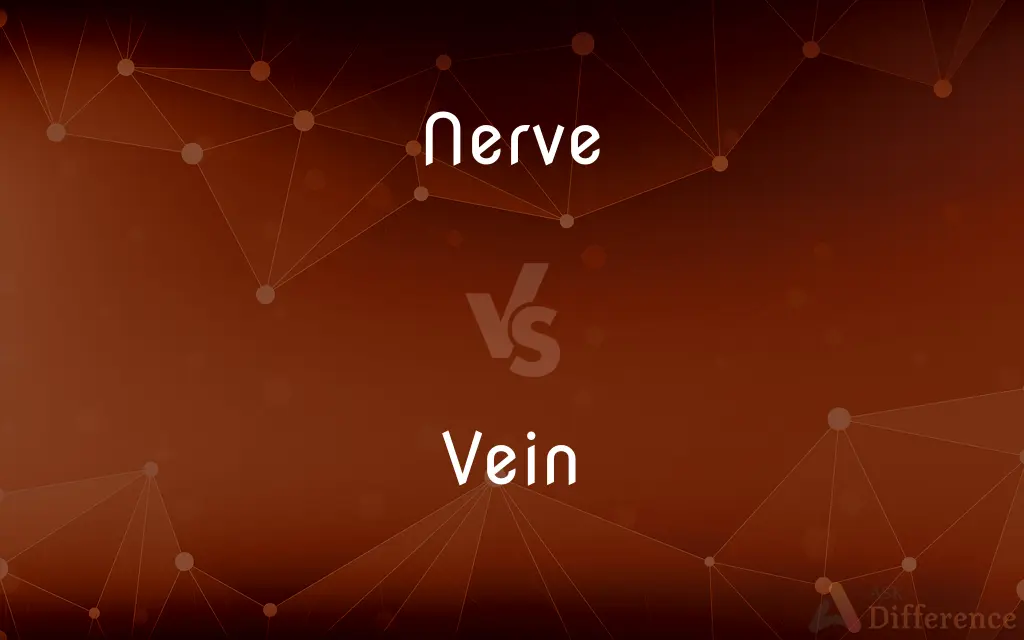Nerve vs. Vein — What's the Difference?
By Fiza Rafique & Maham Liaqat — Updated on April 16, 2024
Nerves transmit electrical signals throughout the body, enabling sensory and motor functions, while veins carry deoxygenated blood back to the heart.

Difference Between Nerve and Vein
Table of Contents
ADVERTISEMENT
Key Differences
Nerves are critical components of the nervous system, responsible for carrying electrical signals that control bodily functions and sensations. Veins, on the other hand, are blood vessels that return deoxygenated blood from various parts of the body to the heart.
The structure of nerves includes axons and dendrites, surrounded by protective myelin sheaths, facilitating rapid signal transmission. Veins are structured with thin walls and valves that prevent the backflow of blood, ensuring it moves in the direction of the heart.
Functionally, nerves can be sensory, motor, or autonomic, each serving different roles in bodily responses and functions. Veins, whereas, primarily function to transport blood, lacking the complex roles seen in nerve function.
Damage to nerves can result in loss of sensation, impaired movement, or dysfunction in the organs they innervate. Damage to veins might lead to circulatory problems, such as varicose veins or deep vein thrombosis.
In terms of medical treatment, nerve injuries might require neurosurgery or other specialized interventions. Veins might be treated with procedures like sclerotherapy, surgical removal, or lifestyle changes to improve circulation.
ADVERTISEMENT
Comparison Chart
Function
Transmits electrical signals
Carries deoxygenated blood to the heart
Components
Axons, dendrites, myelin sheath
Thin walls, valves
Types
Sensory, motor, autonomic
Deep veins, superficial veins
Disorders
Neuropathy, multiple sclerosis
Varicose veins, thrombosis
Treatment Approaches
Neurosurgery, physical therapy
Sclerotherapy, vein stripping
Compare with Definitions
Nerve
A bundle of fibers transmitting impulses of sensation to the brain or spinal cord.
The sciatic nerve is the largest nerve in the human body.
Vein
Less muscular than arteries.
Veins are more compliant than arteries, allowing them to accommodate variable blood volumes.
Nerve
Critical for reflex actions and sensory responses.
Nerves in the hand retract quickly from hot surfaces.
Vein
A blood vessel carrying blood towards the heart.
The superior vena cava returns blood from the upper body to the heart.
Nerve
Can regenerate under certain conditions.
Peripheral nerves have a limited capacity to regenerate after injury.
Vein
Can become varicosed with age or pressure.
Standing for long periods can lead to varicose veins.
Nerve
Affected by diseases like diabetes and multiple sclerosis.
Diabetic neuropathy can cause severe foot pain.
Vein
Commonly accessed for medical procedures like IV injections.
Nurses often use the veins in the arm for IV infusions.
Nerve
Classified into cranial and spinal nerves based on origin.
Cranial nerves originate from the brain and spinal nerves from the spinal cord.
Vein
Contains valves to prevent backflow of blood.
Leg veins have valves that help blood return to the heart against gravity.
Nerve
A nerve is an enclosed, cable-like bundle of fibers (called axons) in the peripheral nervous system. A nerve transmits electrical impulses.
Vein
Veins are blood vessels that carry blood towards the heart. Most veins carry deoxygenated blood from the tissues back to the heart; exceptions are the pulmonary and umbilical veins, both of which carry oxygenated blood to the heart.
Nerve
Any of the cordlike bundles of fibers made up of neurons through which sensory stimuli and motor impulses pass between the brain or other parts of the central nervous system and the eyes, glands, muscles, and other parts of the body. Nerves form a network of pathways for conducting information throughout the body.
Vein
Any of the tubes forming part of the blood circulation system of the body, carrying in most cases oxygen-depleted blood towards the heart.
Nerve
The sensitive tissue in the pulp of a tooth.
Vein
A fracture in rock containing a deposit of minerals or ore and typically having an extensive course underground
Gold-bearing quartz veins
Nerve
A sore point or sensitive subject
The criticism touched a nerve.
Vein
A distinctive quality, style, or tendency
He closes his article in a somewhat humorous vein
Nerve
Courage and control under pressure
Lost his nerve at the last minute.
Vein
(Anatomy) Any of the membranous tubes that form a branching system and carry blood to the heart from the cells, tissues, and organs of the body.
Nerve
Fortitude; stamina.
Vein
A blood vessel of any kind; a vein or artery
Felt the blood pounding in her veins.
Nerve
Forceful quality; boldness.
Vein
Something that looks like a blood vessel, such as the hindgut of a shrimp.
Nerve
Brazen boldness; effrontery
Had the nerve to deny it.
Vein
(Botany) One of the strands of vascular tissue that form the conducting and supporting framework in a leaf or other expanded plant organ. Also called nervure.
Nerve
Nerves Nervous agitation caused by fear, anxiety, or stress
Had a sudden attack of nerves.
Vein
(Zoology) One of the thickened cuticular ribs that form the supporting network of the wing of an insect and that often carry hemolymph. Also called nervure.
Nerve
A vein or rib in the wing of an insect.
Vein
(Geology) A regularly shaped and lengthy occurrence of an ore; a lode.
Nerve
The midrib and larger veins in a leaf.
Vein
A long wavy strip of a different shade or color, as in wood or marble, or as mold in cheese.
Nerve
To give strength or courage to.
Vein
A fissure, crack, or cleft.
Nerve
Body parts A bundle of neurons with their connective tissue sheaths, blood vessels and lymphatics.
The nerves can be seen through the skin.
Vein
A pervading character or quality; a streak
"All through the interminable narrative there ran a vein of impressive earnestness" (Mark Twain).
Nerve
A neuron.
Vein
A transient attitude or mood.
Nerve
(botany) A vein in a leaf; a grain in wood.
Some plants have ornamental value because of their contrasting nerves.
Vein
A particular turn of mind
Spoke later in a more serious vein.
Nerve
Courage; boldness; audacity; gall.
He had the nerve to enter my house uninvited.
He hasn't the nerve to tell her he likes her.
Vein
To supply or fill with veins.
Nerve
Patience; stamina; endurance, fortitude.
The web-team found git-sed is really a time and nerve saver when doing mass changes on your repositories
Vein
To mark or decorate with veins.
Nerve
(in the plural) One's neural structures considered collectively as, and conceptually equated with, one's psyche;
All these rationalizations for asinine behavior are getting on my nerves.
His nerves could no longer handle the worry.
Vein
(anatomy) A blood vessel that transports blood from the capillaries back to the heart.
Nerve
(in the plural) mental agitation caused by fear, stress or other negative emotions.
Ellie had a bad case of nerves before the big test; she was a bundle of nerves.
Vein
(in plural) The entrails of a shrimp.
Nerve
(polymer technology) The elastic resistance of raw rubber or other polymers to permanent deformation during processing.
A nervy tank lining will be difficult to lay around tight bends or in corners because it tends to spring back.Blair Rubber company glossary of terms. [https://blairrubber.com/wp-content/uploads/glossary-of-terms.pdf]
Vein
(botany) In leaves, a thickened portion of the leaf containing the vascular bundle.
Nerve
(obsolete) Sinew, tendon.
Vein
(zoology) The nervure of an insect’s wing.
Nerve
(transitive) To give courage.
May their example nerve us to face the enemy.
Vein
A stripe or streak of a different colour or composition in materials such as wood, cheese, marble or other rocks.
Nerve
(transitive) To give strength; to supply energy or vigour.
The liquor nerved up several of the men after their icy march.
Vein
(geology) A sheetlike body of crystallized minerals within a rock.
Nerve
One of the whitish and elastic bundles of fibers, with the accompanying tissues, which transmit nervous impulses between nerve centers and various parts of the animal body.
Vein
(figurative) A topic of discussion; a train of association, thoughts, emotions, etc.
In the same vein
Nerve
A sinew or a tendon.
Vein
(figurative) A style, tendency, or quality.
The play is in a satirical vein.
Nerve
Physical force or steadiness; muscular power and control; constitutional vigor.
He led me on to mightiest deeds,Above the nerve of mortal arm.
Vein
A fissure, cleft, or cavity, as in the earth or other substance.
Nerve
Steadiness and firmness of mind; self-command in personal danger, or under suffering; unshaken courage and endurance; coolness; pluck; resolution.
Vein
To mark with veins or a vein-like pattern.
Nerve
Audacity; assurance.
Vein
One of the vessels which carry blood, either venous or arterial, to the heart. See Artery, 2.
Nerve
One of the principal fibrovascular bundles or ribs of a leaf, especially when these extend straight from the base or the midrib of the leaf.
Vein
One of the similar branches of the framework of a leaf.
Nerve
One of the nervures, or veins, in the wings of insects.
Vein
One of the ribs or nervures of the wings of insects. See Venation.
Nerve
To give strength or vigor to; to supply with force; as, fear nerved his arm.
Vein
A narrow mass of rock intersecting other rocks, and filling inclined or vertical fissures not corresponding with the stratification; a lode; a dike; - often limited, in the language of miners, to a mineral vein or lode, that is, to a vein which contains useful minerals or ores.
Nerve
Any bundle of nerve fibers running to various organs and tissues of the body
Vein
A fissure, cleft, or cavity, as in the earth or other substance.
Let the glass of the prisms be free from veins.
Nerve
The courage to carry on;
He kept fighting on pure spunk
You haven't got the heart for baseball
Vein
A streak or wave of different color, appearing in wood, and in marble and other stones; variegation.
Nerve
Impudent aggressiveness;
I couldn't believe her boldness
He had the effrontery to question my honesty
Vein
A train of associations, thoughts, emotions, or the like; a current; a course; as, reasoning in the same vein.
He can open a vein of true and noble thinking.
Nerve
Get ready for something difficult or unpleasant
Vein
Peculiar temper or temperament; tendency or turn of mind; a particular disposition or cast of genius; humor; strain; quality; also, manner of speech or action; as, a rich vein of humor; a satirical vein.
Certain discoursing wits which are of the same veins.
Invoke the Muses, and improve my vein.
Vein
To form or mark with veins; to fill or cover with veins.
Vein
A blood vessel that carries blood from the capillaries toward the heart; all veins except the pulmonary carry unaerated blood
Vein
A distinctive style or manner;
He continued in this vein for several minutes
Vein
Any of the vascular bundles or ribs that form the branching framework of conducting and supporting tissues in a leaf or other plant organ
Vein
A layer of ore between layers of rock
Vein
One of the horny ribs that stiffen and support the wing of an insect
Vein
Make a veinlike pattern
Common Curiosities
Can diseases affect both nerves and veins simultaneously?
Conditions like diabetes can affect both nerves (neuropathy) and veins (venous insufficiency) due to long-term effects on circulation and nerve health.
What materials compose nerves and veins?
Nerves are made up of neurons with axons and dendrites, while veins are composed of three layers: intima, media, and adventitia.
What are the signs of nerve damage and vein disease?
Signs of nerve damage include numbness, tingling, and weakness; vein disease symptoms include swelling, pain, and visible varicose veins.
Can nerve and vein health be genetically inherited?
Certain genetic conditions can predispose individuals to nerve disorders like Charcot-Marie-Tooth disease and vein conditions like chronic venous insufficiency.
What are the implications of nerve and vein damage in chronic diseases?
Chronic diseases like diabetes and hypertension can lead to progressive damage to both nerves and veins, complicating treatment and management.
How do nerves and veins interact within the body?
Nerves and veins often run parallel in the body, but nerves control body functions through electrical signals, whereas veins are part of the circulatory system carrying blood.
Are there any lifestyle changes that can improve the health of nerves and veins?
Regular exercise, maintaining a healthy weight, and a balanced diet benefit both nerve and vein health by improving circulation and reducing stress on the circulatory system.
How do medical professionals diagnose disorders of nerves and veins?
Disorders of nerves are diagnosed using electromyography (EMG) and nerve conduction studies; vein disorders are often diagnosed using ultrasound technology.
What advancements have been made in treating nerve and vein disorders?
Recent advancements include minimally invasive surgical techniques for veins and the development of nerve growth factor therapies for nerve damage.
How do stress and mental health impact nerves and veins?
Stress can exacerbate conditions like hypertension that harm veins and can also lead to stress-induced neuropathy affecting nerves.
What role do nerves and veins play in the aging process?
Aging can lead to deterioration in nerve function and elasticity of veins, often resulting in increased sensitivity to pain and circulatory issues.
How do environmental factors affect nerves and veins?
Environmental factors such as exposure to toxins and extreme temperatures can adversely affect nerve function and vein health.
What is the recovery process like for surgeries involving nerves and veins?
Recovery can vary widely; nerve repair surgeries often have a lengthy recovery due to slow nerve regrowth, while vein surgeries like stripping may have quicker recovery times.
What preventive measures can protect nerves and veins?
Protective measures include avoiding repetitive stress, managing blood pressure, and wearing compression garments for vein health.
What are the emergency conditions involving nerves and veins?
Emergencies include acute nerve compression and deep vein thrombosis, both requiring immediate medical intervention to prevent long-term damage.
Share Your Discovery

Previous Comparison
Fake vs. False
Next Comparison
Mol vs. LolAuthor Spotlight
Written by
Fiza RafiqueFiza Rafique is a skilled content writer at AskDifference.com, where she meticulously refines and enhances written pieces. Drawing from her vast editorial expertise, Fiza ensures clarity, accuracy, and precision in every article. Passionate about language, she continually seeks to elevate the quality of content for readers worldwide.
Co-written by
Maham Liaqat













































